新视野大学英语综合教程3 课文及课文翻译Unit2
新视野大学英语(三)SECTION B 课文翻译
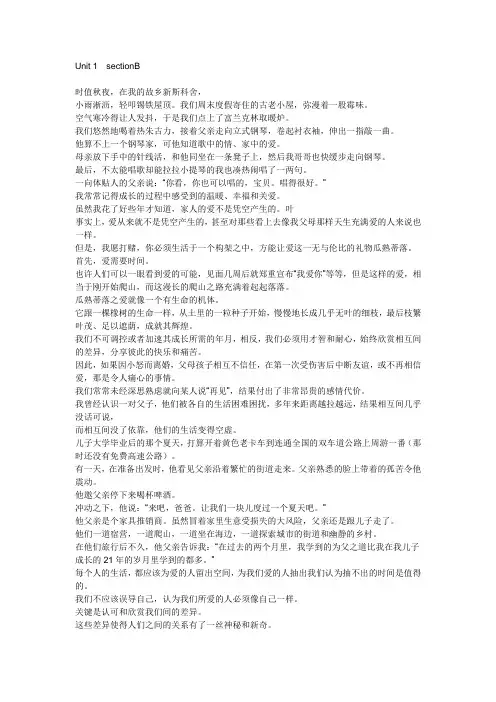
Unit 1 sectionB时值秋夜,在我的故乡新斯科舍,小雨淅沥,轻叩锡铁屋顶。
我们周末度假寄住的古老小屋,弥漫着一股霉味。
空气寒冷得让人发抖,于是我们点上了富兰克林取暖炉。
我们悠然地喝着热朱古力,接着父亲走向立式钢琴,卷起衬衣袖,伸出一指敲一曲。
他算不上一个钢琴家,可他知道歌中的情、家中的爱。
母亲放下手中的针线活,和他同坐在一条凳子上,然后我哥哥也快缓步走向钢琴。
最后,不太能唱歌却能拉拉小提琴的我也凑热闹唱了一两句。
一向体贴人的父亲说:“你看,你也可以唱的,宝贝。
唱得很好。
”我常常记得成长的过程中感受到的温暖、幸福和关爱。
虽然我花了好些年才知道,家人的爱不是凭空产生的。
叶事实上,爱从来就不是凭空产生的,甚至对那些看上去像我父母那样天生充满爱的人来说也一样。
但是,我愿打赌,你必须生活于一个构架之中,方能让爱这一无与伦比的礼物瓜熟蒂落。
首先,爱需要时间。
也许人们可以一眼看到爱的可能,见面几周后就郑重宣布“我爱你”等等,但是这样的爱,相当于刚开始爬山,而这漫长的爬山之路充满着起起落落。
瓜熟蒂落之爱就像一个有生命的机体。
它跟一棵橡树的生命一样,从土里的一粒种子开始,慢慢地长成几乎无叶的细枝,最后枝繁叶茂、足以遮荫,成就其辉煌。
我们不可调控或者加速其成长所需的年月,相反,我们必须用才智和耐心,始终欣赏相互间的差异,分享彼此的快乐和痛苦。
因此,如果因小怒而离婚,父母孩子相互不信任,在第一次受伤害后中断友谊,或不再相信爱,那是令人痛心的事情。
我们常常未经深思熟虑就向某人说“再见”,结果付出了非常昂贵的感情代价。
我曾经认识一对父子,他们被各自的生活困难困扰,多年来距离越拉越远,结果相互间几乎没话可说,而相互间没了依靠,他们的生活变得空虚。
儿子大学毕业后的那个夏天,打算开着黄色老卡车到连通全国的双车道公路上周游一番(那时还没有免费高速公路)。
有一天,在准备出发时,他看见父亲沿着繁忙的街道走来。
父亲熟悉的脸上带着的孤苦令他震动。
全新版大学英语综合教程3课文第2单元Textb翻译
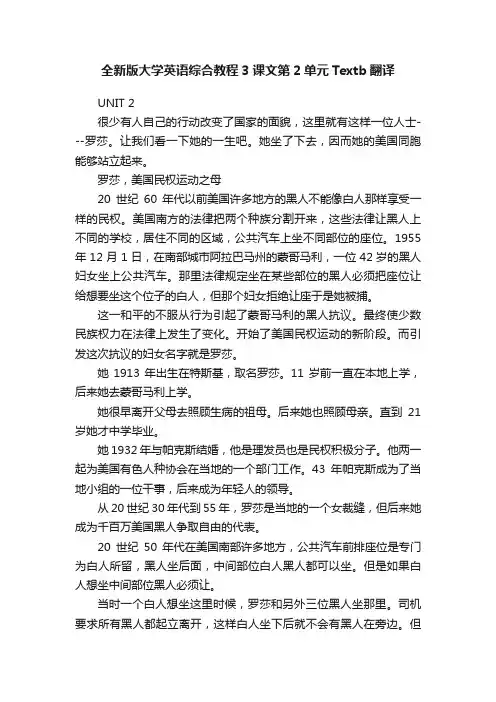
全新版大学英语综合教程3课文第2单元Textb翻译UNIT 2很少有人自己的行动改变了国家的面貌,这里就有这样一位人士---罗莎。
让我们看一下她的一生吧。
她坐了下去,因而她的美国同胞能够站立起来。
罗莎,美国民权运动之母20世纪60年代以前美国许多地方的黑人不能像白人那样享受一样的民权。
美国南方的法律把两个种族分割开来,这些法律让黑人上不同的学校,居住不同的区域,公共汽车上坐不同部位的座位。
1955年12月1日,在南部城市阿拉巴马州的蒙哥马利,一位42岁的黑人妇女坐上公共汽车。
那里法律规定坐在某些部位的黑人必须把座位让给想要坐这个位子的白人,但那个妇女拒绝让座于是她被捕。
这一和平的不服从行为引起了蒙哥马利的黑人抗议。
最终使少数民族权力在法律上发生了变化。
开始了美国民权运动的新阶段。
而引发这次抗议的妇女名字就是罗莎。
她1913年出生在特斯基,取名罗莎。
11岁前一直在本地上学,后来她去蒙哥马利上学。
她很早离开父母去照顾生病的祖母。
后来她也照顾母亲。
直到21岁她才中学毕业。
她1932年与帕克斯结婚,他是理发员也是民权积极分子。
他两一起为美国有色人种协会在当地的一个部门工作。
43年帕克斯成为了当地小组的一位干事,后来成为年轻人的领导。
从20世纪30年代到55年,罗莎是当地的一个女裁缝,但后来她成为千百万美国黑人争取自由的代表。
20世纪50年代在美国南部许多地方,公共汽车前排座位是专门为白人所留,黑人坐后面,中间部位白人黑人都可以坐。
但是如果白人想坐中间部位黑人必须让。
当时一个白人想坐这里时候,罗莎和另外三位黑人坐那里。
司机要求所有黑人都起立离开,这样白人坐下后就不会有黑人在旁边。
但是罗莎拒绝站起立于是她被捕。
一些流传的故事还包括下面这点,罗莎拒绝原因是她但是脚累了,但是多年后她自己说不是这样。
她说她真正感觉厌倦的是她遭受不公平待遇。
后来她解释说,这儿似乎是她结束受人摆布,弄清楚如果有的话究竟有何人权的地方。
新视野大学英语第三册课后翻译(完整版)[中英互译]
![新视野大学英语第三册课后翻译(完整版)[中英互译]](https://uimg.taocdn.com/e75e2456de80d4d8d15a4f67.webp)
1. 被告是位年仅30岁的女子,她坚持称自己无罪。
The defendant a woman of only 30 kept insisting on her own innocence.2. 总体看来,枣、豆类以及一些多叶的绿色食物是最好的铁质来源。
All tings considered dates beans and some leafy green vegetables are the best sources of iron.3. 正餐时不供应饮料,饮料会影响消化。
No beverages are served with meals because they interfere with digestion.4. 考虑到那个地区受欢迎的程度,提前定旅馆是明智的。
Taking the popularity of the region into consideration it is advisable to book hotels in advance. 5. 服药后若有呕吐感,请立即停止使用并尽快咨询医生。
If you have a feeling of wanting to throw up after taking this drug stop taking it immediately and consult your doctors as soon as possible.6. 总结这次结论时,他说双方都要好好考虑怎样以最有效的方式来解决这一问题。
Summing up the discussion he said both parties should consider the most effective way to solve the problem.1.在思维方面,与他的行为一样,他是非常传统的。
In his thinking as in his behavior he is very traditional.2. 教师一旦同意接受新的教学计划,他们就得面对新计划所带给他们的压力。
新视野大学英语第三版读写教程3Unit 2课文
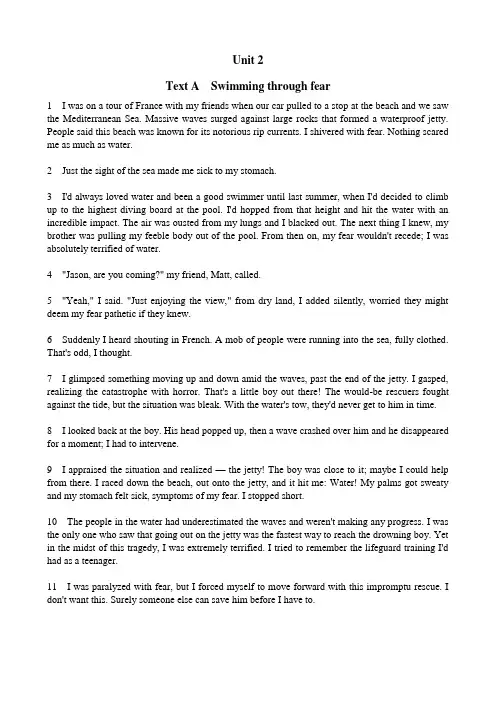
Unit 2Text A Swimming through fear1 I was on a tour of France with my friends when our car pulled to a stop at the beach and we saw the Mediterranean Sea. Massive waves surged against large rocks that formed a waterproof jetty. People said this beach was known for its notorious rip currents. I shivered with fear. Nothing scared me as much as water.2 Just the sight of the sea made me sick to my stomach.3 I'd always loved water and been a good swimmer until last summer, when I'd decided to climb up to the highest diving board at the pool. I'd hopped from that height and hit the water with an incredible impact. The air was ousted from my lungs and I blacked out. The next thing I knew, my brother was pulling my feeble body out of the pool. From then on, my fear wouldn't recede; I was absolutely terrified of water.4 "Jason, are you coming?" my friend, Matt, called.5 "Yeah," I said. "Just enjoying the view," from dry land, I added silently, worried they might deem my fear pathetic if they knew.6 Suddenly I heard shouting in French. A mob of people were running into the sea, fully clothed. That's odd, I thought.7 I glimpsed something moving up and down amid the waves, past the end of the jetty. I gasped, realizing the catastrophe with horror. That's a little boy out there! The would-be rescuers fought against the tide, but the situation was bleak. With the water's tow, they'd never get to him in time.8 I looked back at the boy. His head popped up, then a wave crashed over him and he disappeared for a moment; I had to intervene.9 I appraised the situation and realized — the jetty! The boy was close to it; maybe I could help from there. I raced down the beach, out onto the jetty, and it hit me: Water! My palms got sweaty and my stomach felt sick, symptoms of my fear. I stopped short.10 The people in the water had underestimated the waves and weren't making any progress. I was the only one who saw that going out on the jetty was the fastest way to reach the drowning boy. Yet in the midst of this tragedy, I was extremely terrified. I tried to remember the lifeguard training I'd had as a teenager.11 I was paralyzed with fear, but I forced myself to move forward with this impromptu rescue. I don't want this. Surely someone else can save him before I have to.12 At the ridge of the jetty, I whirled around, convinced I'd see an athletic swimmer plowing through the rough water toward the boy. To my dismay, no one was there. I turned back out to the sea to see the boy battered by vicious waves about 25 yards away from me. Sucking in a deep breath, I threw myself into the water. As soon as I jumped in, I felt like I was back in that pool, breathless, struggling, terrified. Salt stung my eyes. Focus, I shouted in my head. Where is he?13 Then, with clarity, I saw a thin arm waving weakly a few yards away. I swam with all my strength, reaching the boy just as he sank below the surface. I grabbed his arm and pulled. He popped back up, eyes wide with terror, pawing and twisting against me. "Repose (Calm down)!" I commanded the boy in French. His struggling would derail any rescue attempt, and we'd both perish. "Repose!" I commanded again. Thankfully, this time he listened, and was still.14 When I turned back toward shore a wave pounded over us. The jetty was further away! The rip current! It was forcibly dragging us out to the sea. I fought to get us back to land, but made little progress. I knew I'd never be able to escort him back like this.15 Desperate to survive, I remembered what I'd learned in my life saving class: Never, ever swim against the rip current! Swim sideways to the pull of the current and slowly make your way back toward shore. It was an odd-looking but practicable solution. Swim sideways and float to rest. Swim sideways and float to rest. We did that over and over. We slowly made our way to safety. "Jason, you can do it!" I heard Matt say as he stood on the jetty. I hadn't even noticed how close we were, only about seven feet left to go.16 And, as we made our way to safety I realized something incredible: I was no longer afraid. That absence of fear was a moment of triumph!17 Matt jumped into the water. I tossed the boy to him. Just as I let go, a big wave picked him up and carried him all the way to Matt.18 On the brink of collapse, I stopped fighting, just letting myself go. My hand hit the jetty. It was like an electric shock that brought me back to my senses. Someone grabbed for me.19 I felt strong arms lift me. I ascended not only from the sea onto the secure rocks of the jetty —but also to my salvation, leaving behind the terrible fear that had gripped me for so long. I turned my head and saw the boy was hugged tightly by his mother. I looked out to the sea. Weary as I was, the water had never looked so beautiful.Unit 2Text B When courage triumphed over fear1 I know what courage looks like. I saw it on a flight I took six years ago, and only now can I speak of it without tears filling my eyes at the memory.2 When our plane left New York that Friday morning, we were a talkative, high-energy group. The early-morning transcontinental flight hosted mainly professional people going to San Francisco for a day or two of business. As I looked around, I saw lots of designer suites, CEO-level expensive haircuts, designer briefcases and all the trimmings of lofty business travelers. I settled back with my paperback novel for some light reading and the brief flight ahead.3 Immediately upon take-off, long before we had reached our cruising altitude, it was clear that something was wrong. The aircraft was bumping vertically up and down and tilting left to right. All the experienced travelers, including me, looked around with knowing grins. We had experienced minor problems and turbulence on prior flights. If you fly very much, you see these things and learn to act relaxed about them.4 It wasn't long before our relaxed attitudes began to evaporate. Minutes after we were in flight, our plane began dipping wildly and one wing plunged downward. The plane climbed higher but that didn't help our plight. The pilot soon provided some grave news regarding the flight.5 "We are having some difficulties," he said. "At this time, it appears we have no nose-wheel steering. Our indicators show that our landing system has failed, which necessitates that we abort the flight and return to New York. Because of the problems with the mechanism o, if you look out the windows, you will see that we are dumping fuel from the airplane. We want to have as little on board as possible in the event of a rough touchdown."6 In other words, we were about to crash. No sight has ever been so sobering as that fuel, hundreds of gallons of it, streaming past my window out of the plane's tanks. The flight attendants scrambled to get people into position and comforted those who were instantaneously hysterical.7 As I looked at the faces of my fellow business travelers, I was stunned by the changes I saw. Many looked visibly frightened now. Even the most sophisticated looked vulnerable and grim. Their faces actually looked panicked. There wasn't a single exception, and I realized that no one faces death without fear; no one is immune to its terror.8 Then, somewhere in my proximity, I overheard a still calm voice underlying the panic. It was a woman's voice, speaking in an absolutely normal conversational tone. Despite the circumstance, there was no angry emotion or tension, and this calm voice evoked a calm in me that quieted some of my initial fears. It became imperative that I find her.9 All around the cabin, people cried. Many moaned and screamed. A few of the men maintained their appearance of calm by bracing against their armrests and grinding their teeth, but their fear was written all over them.10 Try as I might, I could not have spoken so calmly, so sweetly at that moment as the fabulous voice I heard. Finally, I saw her.11 In the midst of all the chaos, a mother was talking, just talking to her child. The woman, in her mid-30's and unremarkable looking in any other way, was staring full into the face of her daughter, who looked about four years old. The child listened closely, sensing that her mother's words were invaluable. The mother's gaze held the child so fixed and intent that the child seemed untouched by the sounds of grief and fear all around her.12 I strained to hear what this mother was telling her child. I relished the sound of calm confidence amongst the terror. Finally, I hovered nearby and by some miracle could hear her soft, sure, confident voice say in a calming tone over and over again, "I love you so much. Do you know for sure that I love you more than anything?"13 "Yes, Mommy," the little girl said.14 "And remember, no matter what happens, that I love you always; and that you are a good girl. Sometimes things happen that are not your fault. You are my beloved, good girl and my love will always be with you."15 As her first concern was for her daughter's well-being, the mother then put her body over her daughter's, strapping the seat belt over both of them to save her daughter from a possible wreckage.16 Then, for no earthly reason, our landing gear held and we glided to a gentle stop. It was all over in seconds. Our touchdown was smooth and easy; the tragedy we had feared was not our destiny.17 The voice I heard that day never hesitated, never acknowledged dread, and maintained an evenness that seemed emotionally and physically impossible. During that descent, not one of the hardened business people could have spoken without a hint of fear in their voice. Only the greatest courage, with a foundation of even greater love, had brought that mother up and lifted her above the chaos around her.18 That mom showed me the amazing power of love. And for those few minutes, I heard the voice of true courage.。
新视野大学英语第三版读写教程第三册Unit2A课文及翻译
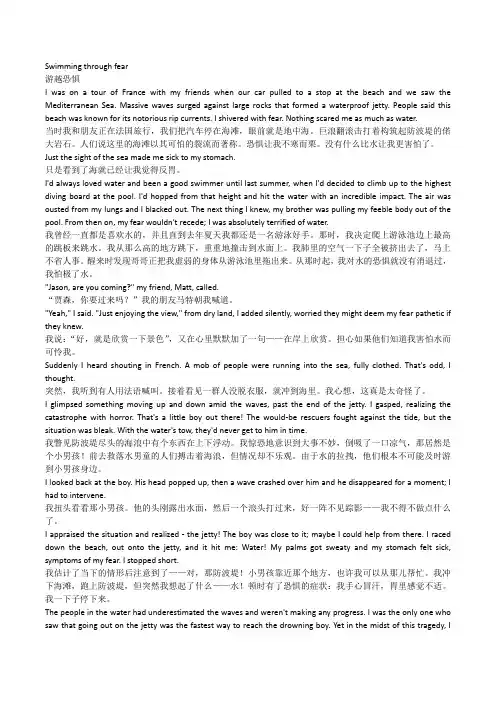
Swimming through fear游越恐惧I was on a tour of France with my friends when our car pulled to a stop at the beach and we saw the Mediterranean Sea. Massive waves surged against large rocks that formed a waterproof jetty. People said this beach was known for its notorious rip currents. I shivered with fear. Nothing scared me as much as water.当时我和朋友正在法国旅行,我们把汽车停在海滩,眼前就是地中海。
巨浪翻滚击打着构筑起防波堤的偌大岩石。
人们说这里的海滩以其可怕的裂流而著称。
恐惧让我不寒而栗。
没有什么比水让我更害怕了。
Just the sight of the sea made me sick to my stomach.只是看到了海就已经让我觉得反胃。
I'd always loved water and been a good swimmer until last summer, when I'd decided to climb up to the highest diving board at the pool. I'd hopped from that height and hit the water with an incredible impact. The air was ousted from my lungs and I blacked out. The next thing I knew, my brother was pulling my feeble body out of the pool. From then on, my fear wouldn't recede; I was absolutely terrified of water.我曾经一直都是喜欢水的,并且直到去年夏天我都还是一名游泳好手。
新视野大学英语第三版读写教程第三册-Unit2B课文翻译
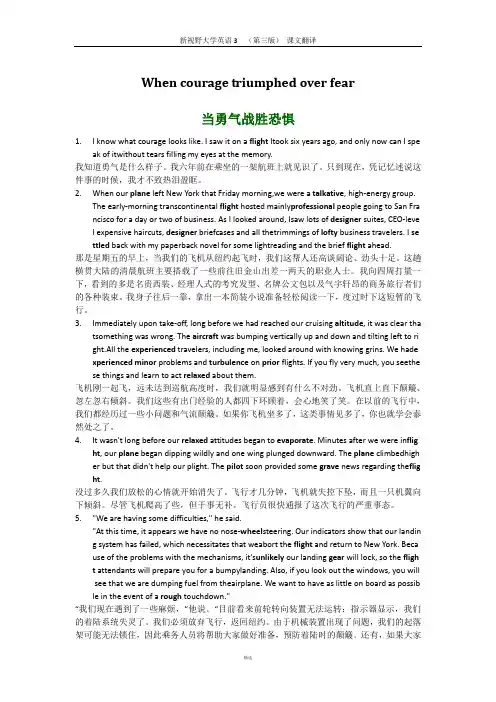
When courage triumphed over fear当勇气战胜恐惧1.I know what courage looks like. I saw it on a flight Itook six years ago, and only now can I speak of itwithout tears filling my eyes at the memory.我知道勇气是什么样子。
我六年前在乘坐的一架航班上就见识了。
只到现在,凭记忆述说这件事的时候,我才不致热泪盈眶。
2.When our plane left New York that Friday morning,we were a talkative, high-energy group.The early-morning transcontinental flight hosted mainly professional people going to San Fra ncisco for a day or two of business. As I looked around, Isaw lots of designer suites, CEO-leve l expensive haircuts, designer briefcases and all thetrimmings of lofty business travelers. I se ttled back with my paperback novel for some lightreading and the brief flight ahead.那是星期五的早上,当我们的飞机从纽约起飞时,我们这帮人还高谈阔论、劲头十足。
这趟横贯大陆的清晨航班主要搭载了一些前往旧金山出差一两天的职业人士。
我向四周打量一下,看到的多是名贵西装、经理人式的考究发型、名牌公文包以及气宇轩昂的商务旅行者们的各种装束。
新视野大学英语综合教程3课文及课文翻译
1 It is not surprising that modern children tend to look blank and dispirited when informed that they will someday have to "go to work and make a living". The problem is that they cannot visualize what work is in corporate America.2 Not so long ago, when a parent said he was off to work, the child knew very well what was about to happen. His parent was going to make something or fix something. The parent could take his offspring to his place of business and let him watch while he repaired a buggy or built a table.3 When a child asked, "What kind of work do you do, Daddy?" his father could answer in terms that a child could come to grips with, such as "I fix steam engines" or "I make horse collars".4 Well, a few fathers still fix steam engines and build tables, but most do not. Nowadays, most fathers sit in glass buildings doing things that are absolutely incomprehensible to children. The answers they give when asked, "What kind of work do you do, Daddy?" are likely to be utterly mystifying to a child.5 "I sell space." "I do market research." "I am a data processor." "I am in public relations." "I am a systems analyst." Such explanations must seem nonsense to a child. How can he possibly envision anyone analyzing a system or researching a market?6 Even grown men who do market research have trouble visualizing what a public relations man does with his day, and it is a safe bet that the average systems analyst is as baffled about what a space salesman does at the shop as the average space salesman is about the tools needed to analyze a system.7 In the common everyday job, nothing is made any more. Things are now made by machines. Very little is repaired. The machines that make things make them in such a fashion that they will quickly fall apart in such a way that repairs will be prohibitively expensive. Thus the buyer is encouraged to throw the thing away and buy a new one. In effect, the machines are making junk.8 The handful of people remotely associated with these machines can, of course, tell their inquisitive children "Daddy makes junk". Most of the workforce, however, is too remote from junk production to sense any contribution to the industry. What do these people do?9 Consider the typical 12-story glass building in the typical American city. Nothing is being made in this building and nothing is being repaired, including the building itself. Constructed as a piece of junk, the building will be discarded when it wears out, and another piece of junk will be set in its place.10 Still, the building is filled with people who think of themselves as working. At any given moment during the day perhaps one-third of them will be talking into telephones. Most of these conversations will be about paper, for paper is what occupies nearly everyone in this building.11 Some jobs in the building require men to fill paper with words. There are persons who type neatly on paper and persons who read paper and jot notes in the margins. Some persons make copies of paper and other persons deliver paper. There are persons who file paper and persons who unfile paper.12 Some persons mail paper. Some persons telephone other persons and ask that paper be sent to them. Others telephone to ascertain the whereabouts of paper. Some persons confer about paper. In the grandest offices, men approve of some paper and disapprove of other paper.13 The elevators are filled throughout the day with young men carrying paper from floor to floor and with vital men carrying paper to be discussed with other vital men.14 What is a child to make of all this? His father may be so eminent that he lunches with other men about paper. Suppose he brings his son to work to give the boy some idea of what work is all about. What does the boy see happening?15 His father calls for paper. He reads paper. Perhaps he scowls at paper. Perhaps he makes an angry red mark on paper. He telephones another man and says they had better lunch over paper.16 At lunch they talk about paper. Back at the office, the father orders the paper retyped and reproduced in quintuplicate, and then sent to another man for comparison with paper that was reproduced in triplicate last year.17 Imagine his poor son afterwards mulling over the mysteries of work witha friend, who asks him, "What's your father do?" What can the boy reply? "It beats me," perhaps, if he is not very observant. Or if he is, "Something that has to do with making junk, I think. Same as everybody else."在美国大公司工作要是有人跟现在的孩子说他们长大后要“去工作以谋生”,他们往往会表现出一脸的茫然和沮丧,这并不奇怪。
新标准大学英语综合教程3课文与课后翻译unit2
4 Translate the paragraphs into Chinese.1 My flying dreams were believable as a landscape by Dali, so real that I would awake with a sudden shock, a breathless sense of having tumbled like Icarus from the sky and caught myself on the soft bed just in time. These nightly adventures in space began when Superman started invading my dreams and teaching me how to fly. He used to come roaring by in his shining blue suit with his cape whistling in the wind, looking remarkably like my Uncle Frank who was living with mother and me. In the magic whirling of his cape I could hear the wings of a hundred seagulls, the motors of a thousand planes.我的飞行梦像达利的风景画那么真实可信,以致于自己常常会在一阵惊吓中醒来,好像伊卡罗斯那样从空中摔下来,虽然发现自己刚好掉到软软的床上,但也被吓得喘不过气来。
当超人开始侵入我的梦乡,并教给我飞行的技巧之后,我每夜的太空冒险便开始了。
超人身着耀眼的蓝色衣服,肩披随风飕飕作响的斗篷,经常从我身边呼啸而过。
他长得太像我的舅舅弗兰克了,舅舅那会儿正跟妈妈和我住在一起。
新视野大学英语3第三版课文翻译
新视野大学英语3第三版课文翻译Unit 1 The Way to Success课文ANever, ever give up!永不言弃!As a young boy, Britain's great Prime Minister, Sir Winston Churchill, attended a public school called Harrow. He was not a good student, and had he not been from a famous family, he probably would have been removed from the school for deviating from the rules. Thankfully, he did finish at Harrow and his errors there did not preclude him from going on to the university. He eventually had a premier army career whereby he was later elected prime minister. He achieved fame for his wit, wisdom, civic duty, and abundant courage in his refusal to surrender during the miserable dark days of World War II. His amazing determination helped motivate his entire nation and was an inspiration worldwide.Toward the end of his period as prime minister, he was invited to address the patriotic young boys at his old school, Harrow. The headmaster said, "Young gentlemen, the greatest speaker of our time, will be here in a few days to address you, and you should obey whatever sound advice he may give you." The great day arrived. Sir Winston stood up, all five feet, five inches and 107 kilos of him, and gave this short, clear-cut speech: "Young men, never give up. Never give up! Never give up! Never, never, never, never!"英国的伟大首相温斯顿·丘吉尔爵士,小时候在哈罗公学上学。
新视野大学英语三课后答案及课文翻译Unit2
Unit2Section APre-reading activities一1T 2F 3T 4F 5 FLanguage focusWord in use三1intervene 2underestimate 3recede 4deem 5bleak 6appraise 7paralyzed 8symptoms 9dismay 10brinkWord building四Words learned New words formed-anceDominate DominanceAvoid AvoidanceRely RelianceAcquaint AcquaintanceClear ClearanceAnnoy AnnoyanceAdmit AdmittanceResemble ResemblanceAssure Assurance-edBore BoredPrivilege PrivilegedDistract Distracted五1 bored 2privileged 3 assurance 4 dominance 5 avoidance 6 acquaintance 7 reliance 8 clearance 9 distracted 10 annoyance 11 admittance 12resemblanceBlanked cloze六1K 2D 3H 4J 5I 6O 7G 8A 9N 10CExpression in use七1pulled to a stop 2black out 3pop up 4stopped short 5plowed through 6threw himself into 7let yourself go 8grabbed forTranslation美国梦是美利坚合众国的民族精神。
该词有各类各样的用法,但其根本含义是,在美国任何人都可以通过尽力取得成功,都有可能过上幸福而成功的生活。
- 1、下载文档前请自行甄别文档内容的完整性,平台不提供额外的编辑、内容补充、找答案等附加服务。
- 2、"仅部分预览"的文档,不可在线预览部分如存在完整性等问题,可反馈申请退款(可完整预览的文档不适用该条件!)。
- 3、如文档侵犯您的权益,请联系客服反馈,我们会尽快为您处理(人工客服工作时间:9:00-18:30)。
The glass castle1 I never believed in Santa Claus.2 None of us kids did. Mom and Dad refused to let us. They couldn't afford expensive presents, and they didn't want us to think we weren't as good as other kids who, on Christmas morning, found all sorts of fancy toys under the tree that were supposedly left by Santa Claus. So they told us all about how other kids were deceived by their parents, how the toys the grown-ups claimed were made by little elves wearing bell caps in their workshop at the North Pole actually had labels on them saying MADE IN JAPAN.3 "Try not to look down on those other children," Mom said. "It's not their fault that they've been brainwashed into believing silly myths."4 We celebrated Christmas, but usually about a week after December 25, when you could find perfectly good bows and wrapping paper that people had thrown away and Christmas trees discarded on the roadside that still had most of their needles and even some silver tinsel hanging on them. Mom and Dad would give us a bag of marbles or a doll or a slingshot that had been marked way down in an after-Christmas sale.5 Dad lost his job at the gypsum mine after getting in an argument with the foreman, and when Christmas came that year, we had no money at all. On Christmas Eve, Dad took each of us kids out into the desert night one by one. I had a blanket wrapped around me, and when it was my turn, I offered to share it with Dad, but he said no thanks. The cold never bothered him. I was five that year and I sat next to Dad and we looked up at the sky. Dad loved to talk about the stars. He explained to us how they rotated through the night sky as the earth turned. He taught us to identify the constellations and how to navigate by the North Star. Those shining stars, he liked to point out, were one of the special treats forpeople like us who lived out in the wilderness. Rich city folks, he'd say, lived in fancy apartments, but their air was so polluted they couldn't even see the stars. We'd have to be out of our minds to want to trade places with any of them.6 "Pick out your favorite star," Dad said that night. He told me I could have it for keeps. He said it was my Christmas present. "You can't give me a star!"I said. "No one owns the stars." "That's right," Dad said. "No one else owns them. You just have to claim it before anyone else does, like that dago fellow Columbus claimed America for Queen Isabella. Claiming a star as your own has every bit as much logic to it."7 I thought about it and realized Dad was right. He was always figuring out things like that.8 I could have any star I wanted, Dad said, except Betelgeuse and Rigel, because Lori and Brian had already laid claim to them.9 I looked up to the stars and tried to figure out which was the best one. You could see hundreds, maybe thousands or even millions, twinkling in the clear desert sky. The longer you looked and the more your eyes adjusted to the dark, the more stars you'd see, layer after layer of them gradually becoming visible. There was one in particular, in the west above the mountains but low in the sky, that shone more brightly than all the rest.10 "I want that one," I said.11 Dad grinned. "That's Venus," he said. Venus was only a planet, he went on, and pretty dinky compared to real stars. She looked bigger and brighter because she was much closer than the stars. Poor old Venus didn't even make her own light, Dad said. She shone only from reflected light. He explained to me that planets glowed because reflected light was constant, and stars twinkled because their light pulsed.12 "I like it anyway," I said. I had admired Venus even before that Christmas. You could see it in the early evening, glowing on the western horizon, and if you got up early, you could still see it in the morning, after all the stars had disappeared.13 "What the hell," Dad said. "It's Christmas. You can have a planet if you want."14 And he gave me Venus.15 That evening over Christmas dinner, we all discussed outer space. Dad explained light years and black holes and quasars and told us about the special qualities of Betelgeuse, Rigel, and Venus. Betelgeuse was a red star in the shoulder of the constellation Orion. It was one of the largest stars you could see in the sky, hundreds of times bigger than the sun. It had burned brightly for millions of years and would soon become a supernova and burn out. I got upset that Lori had chosen a clunker of a star, but Dad explained that "soon" meant hundreds of thousands of years when you were talking about stars.16 Rigel was a blue star, smaller than Betelgeuse, Dad said, but even brighter. It was also in Orion—it was his left foot, which seemed appropriate, because Brian was an extra-fast runner.17 Venus didn't have any moons or satellites or even a magnetic field, but it did have an atmosphere sort of similar to earth's, except it was super-hot—about five hundred degrees or more. "So," Dad said, "when the sun starts to burn out and earth turns cold, everyone here might want to move to Venus to get warm. And they'll have to get permission you're your descendants first."18 We laughed about all the kids who believed in the Santa myth and got nothing for Christmas but a bunch of cheap plastic toys. "Years from now, when all the junk they got is broken and long forgotten," Dad said, "you'll still have yourstars."玻璃城堡我从来不相信有圣诞老人。
